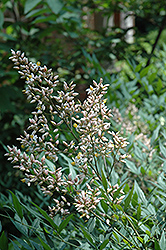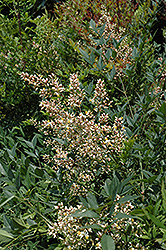It's all about ...
plants

White Berry Nandina
Nandina domestica 'Alba'
Height: 6 feet
Spread: 6 feet
Sunlight:
![]()
![]()
![]()
Hardiness Zone: 6b
Other Names: Heavenly Bamboo
Description:
An open evergreen shrub loaded with creamy-white berries in the fall; the fall foliage has a light-green to yellow color and lacks the red color of the species; very upright and leggy, excellent in mass plantings for textural effect
Ornamental Features
White Berry Nandina is primarily grown for its highly ornamental fruit. It features an abundance of magnificent creamy white berries from early fall to late winter. It has attractive light green evergreen foliage. The narrow compound leaves are highly ornamental and remain light green throughout the winter. It has masses of beautiful clusters of white flowers rising above the foliage from mid to late spring, which are most effective when planted in groupings.
Landscape Attributes
White Berry Nandina is a multi-stemmed evergreen shrub with an upright spreading habit of growth. Its relatively fine texture sets it apart from other landscape plants with less refined foliage.
This shrub will require occasional maintenance and upkeep, and is best pruned in late winter once the threat of extreme cold has passed. Gardeners should be aware of the following characteristic(s) that may warrant special consideration;
- Suckering
White Berry Nandina is recommended for the following landscape applications;
- Accent
- Mass Planting
- Hedges/Screening
- General Garden Use
- Container Planting
Planting & Growing
White Berry Nandina will grow to be about 6 feet tall at maturity, with a spread of 6 feet. It tends to be a little leggy, with a typical clearance of 2 feet from the ground, and is suitable for planting under power lines. It grows at a medium rate, and under ideal conditions can be expected to live for approximately 30 years.
This shrub performs well in both full sun and full shade. However, you may want to keep it away from hot, dry locations that receive direct afternoon sun or which get reflected sunlight, such as against the south side of a white wall. It does best in average to evenly moist conditions, but will not tolerate standing water. It is not particular as to soil type or pH. It is highly tolerant of urban pollution and will even thrive in inner city environments. This is a selected variety of a species not originally from North America.
White Berry Nandina makes a fine choice for the outdoor landscape, but it is also well-suited for use in outdoor pots and containers. With its upright habit of growth, it is best suited for use as a 'thriller' in the 'spiller-thriller-filler' container combination; plant it near the center of the pot, surrounded by smaller plants and those that spill over the edges. It is even sizeable enough that it can be grown alone in a suitable container. Note that when grown in a container, it may not perform exactly as indicated on the tag - this is to be expected. Also note that when growing plants in outdoor containers and baskets, they may require more frequent waterings than they would in the yard or garden. Be aware that in our climate, most plants cannot be expected to survive the winter if left in containers outdoors, and this plant is no exception. Contact our experts for more information on how to protect it over the winter months.
This plant is not reliably hardy in our region, and certain restrictions may apply; contact the store for more information.

